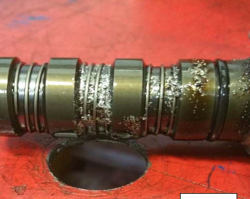— Chrysler engine ticking noise has caused a class action lawsuit that includes several models equipped with Gen III 5.7-liter HEMI or 6.4-liter HEMI 392 V8 engines.
The three owners who sued allege the HEMI V8 engines use valve train systems called multi-displacement systems that are defective and malfunction, causing engine ticking noise, failures of the camshafts, lifters and finally failures of the HEMI engines.
The Fiat Chrysler (FCA) vehicles allegedly "buck, surge, misfire, idle roughly and make abnormal noises including ticking, knocking, and chirping."
The lawsuit also claims the HEMI engines can lose power while the vehicles are driven.
According to the plaintiffs, the HEMI engines should last at least 200,000 miles and the valve train components should last more than 100,000 miles.
The class action lawsuit says this is a "partial list" of the affected vehicles.
- 2014-2016 Chrysler 300
- 2014-2016 Dodge Challenger
- 2014-2016 Dodge Charger
- 2014-2021 Dodge Durango
- 2014-2022 Jeep Grand Cherokee
- 2014-2020 RAM 1500
- 2014-2022 RAM 2500
- 2014-2022 RAM 3500
In addition to engine ticking noise, the alleged defects cause wear to the HEMI engines which require replacements of the valve train components and camshafts.
Pieces of the valve train components allegedly circulate in the engine oil and damage the cylinders to the point of complete failures of the HEMI engines. According to the plaintiffs, all of this occurs well before the useful life of the engine ends.
The alleged engine ticking defects cause the Chrysler vehicles to suffer decreased values and force owners and lessees to spend thousands of dollars to replace the lifters, camshafts and HEMI engines.
However, the class action lawsuit asserts replacing the engines and components does not do anything to repair the problem because the replacement engines and parts are just as defective as the original components.
The plaintiffs also claim Chrysler dealers often make incomplete repairs because the "lifters not totally replaced, other engine components that were damaged by the valve train’s failure may not be replaced at all."
Because metal shavings circulate through the oil and HEMI engine, the lawsuit alleges Chrysler customers are expected to pay about $15,000 to replace the HEMI V8 engines. Then those Chrysler engines cause the exact same ticking noise and other problems until the replacement HEMI engines must be replaced.
FCA has allegedly been aware of the HEMI engine defects since 2012, but the automaker concealed the problems the past 10 years and allegedly told customers the ticking and other strange noises were normal.
According to the class action lawsuit, customers who visit Chrysler dealers for repairs are allegedly told the the ticking noise is normal and no repairs are necessary.
"FCA has also failed to authorize permanent or complete repairs under warranty. In this way, FCA has effectively and knowingly transferred the costs of repair to consumers, despite the requirements of its express warranties." — Chrysler engine class action lawsuit
The lawsuit says engine ticking noise and other related HEMI problems caused Chrysler to issue STAR Case Report S1709000010 in 2017 which said, “[t]his communication documents a record of past experiences” and “captures all previous cases known that appear to be similar or related to the vehicle symptom / condition.”
“Customer complaints may include abnormal engine noise, rough idle, lack of power, misfire. Upon investigation, it may be found that there is excessive camshaft lobe wear/lifter wear (roller failure) on one or more cam lobes and that camshaft/lifter replacement is necessary.” — STAR Case Report S1709000010
Dealers were told:
“If excessive camshaft lobe wear/lifter wear (roller failure) has been identified, further inspection should be performed before attempting repair. Removal of the Oil Control Vale (OCV) for the Variable Valve Timing (VVT) system should be performed to inspect for debris.”
Chrysler dealers were told to remove the OCV and inspect the screens for metal debris. If no debris was found, a dealer was to replace the camshafts and lifters. However, Chrysler told technicians to replace the HEMI engine if debris was found, as seen in the photo above showing the metallic particles.
The Chrysler engine ticking noise lawsuit was filed by these three plaintiffs.
- Shawn Petro / Illinois / 2020 RAM 2500
- Mike Fairchild / Oklahoma / 2015 Dodge RAM 1500
- David Kinchen / Louisiana / 2016 RAM 1500
The Chrysler engine ticking class action lawsuit was filed in the U.S. District Court for the District of Delaware: Petro, et al., v. FCA US LLC.
The plaintiffs are represented by Berger Montague PC, Capstone APC, Kopelowitz Ostrow Ferguson Weiselberg Gilbert, and Gordon & Partners, P.A.

